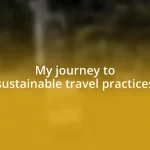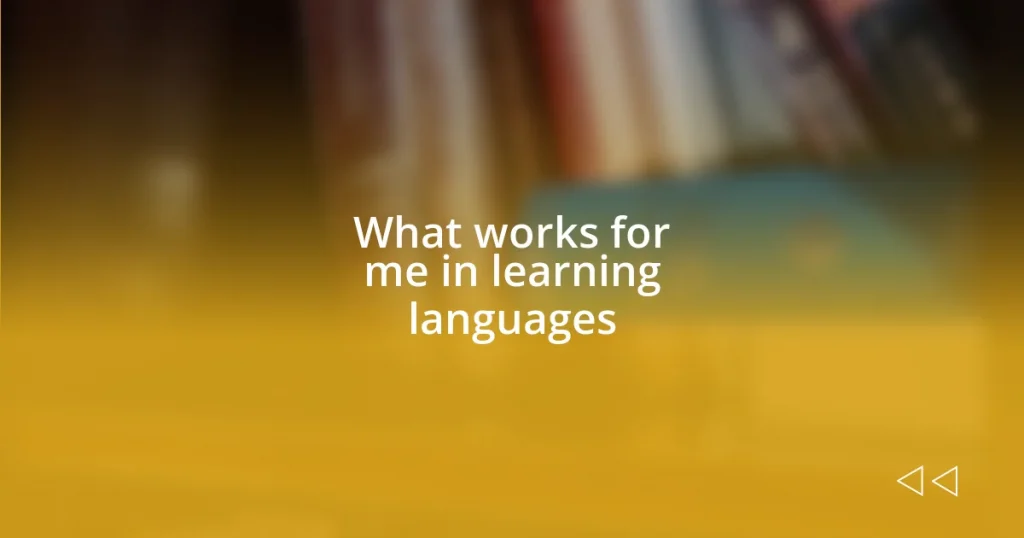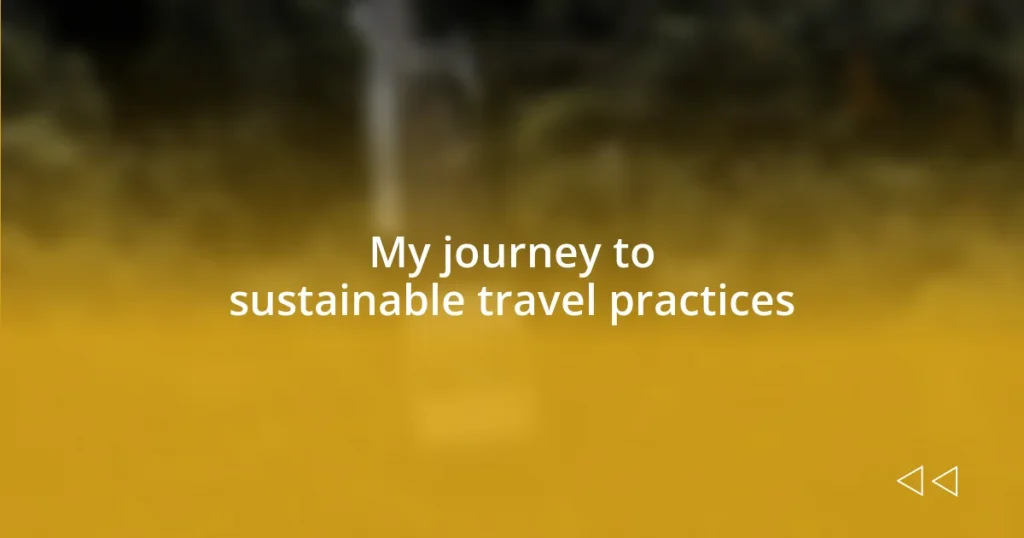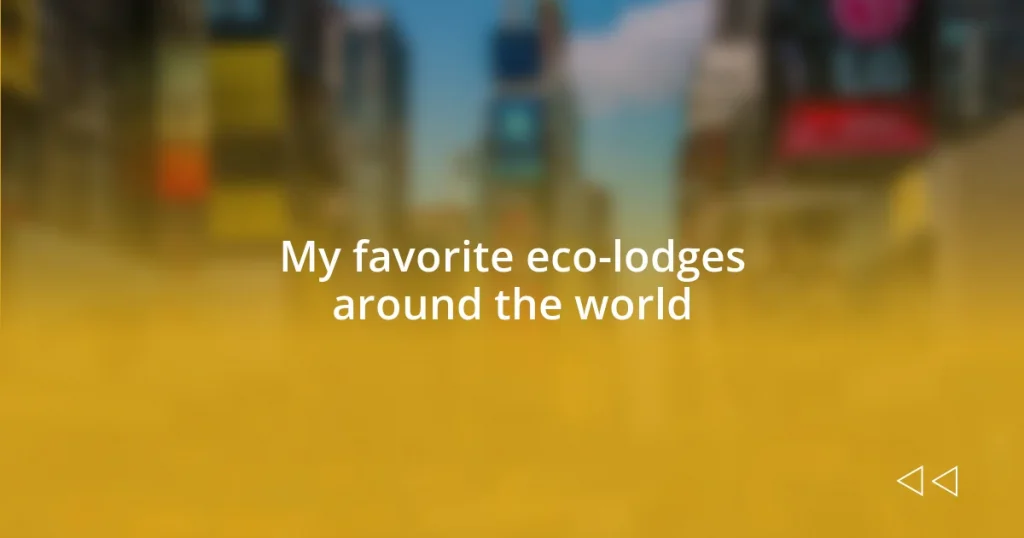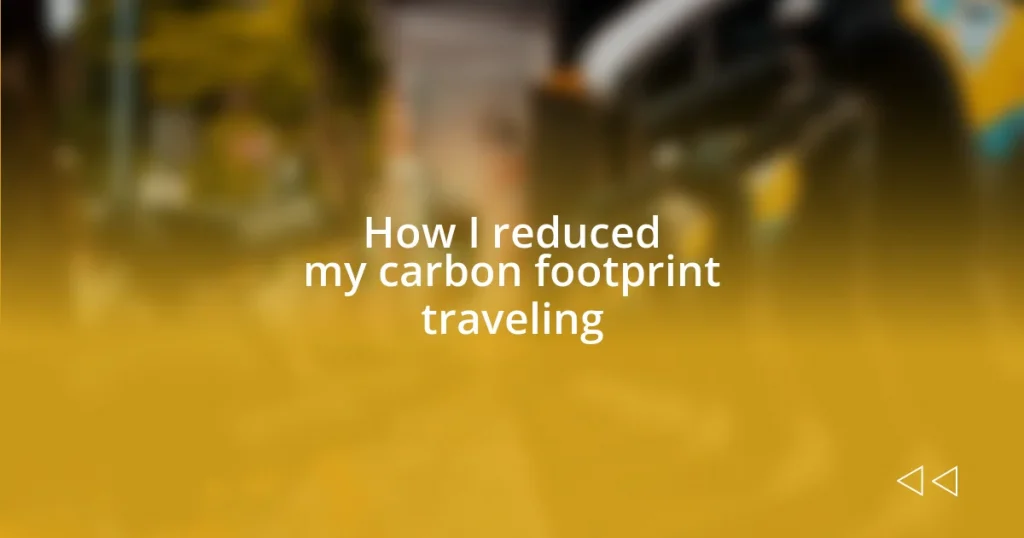Key takeaways:
- Identify your personal learning style and use methods that resonate with you, such as visual aids and immersion experiences.
- Set clear, achievable language goals and track progress to maintain motivation and a sense of purpose in your learning journey.
- Engage with language communities and practice speaking regularly to enhance fluency and gain cultural insights.

Identify personal learning style
Understanding your personal learning style is crucial when it comes to mastering a language. I remember when I first started learning Spanish; I struggled with traditional methods that relied heavily on memorization. It wasn’t until I discovered that I learn best through visual aids—like flashcards and infographics—that everything clicked. Have you ever felt frustrated with a method that just didn’t resonate with you?
I find that reflecting on past experiences can really illuminate what works for us. For instance, when I tried immersing myself in movies and music, I realized that I could pick up words and phrases more naturally. This hands-on approach felt less like studying and more like living the language. If you’ve ever watched a foreign film and been inspired to learn the language after, you know firsthand the power of engagement.
Moreover, our emotions play a significant role in how we absorb information. I often notice that when I’m excited about a topic, my ability to learn skyrockets. Engaging with materials that connect with our interests, whether it’s through books, podcasts, or conversations, can make the learning process enjoyable and effective. Do you remember the last time you were genuinely excited about learning something new? That joy often leads to deeper understanding and retention.

Set clear language goals
Setting clear language goals is essential for guiding your learning journey and keeping you motivated. I still recall when I first tackled French; I set a goal of having a basic conversation within three months. That timeline felt both challenging and exciting, pushing me to immerse myself in the language daily. Have you ever given yourself such a target? It could make the learning process feel more purposeful.
Narrowing down your goals can be just as beneficial. For example, instead of aiming to master all aspects of a language, I focused specifically on conversation skills. By honing in on listening and speaking, I gradually built the confidence to interact with native speakers. This experience taught me that sometimes less is more; focusing on fewer, achievable objectives can lead to significant progress. Don’t you find that achievable milestones make the journey feel rewarding?
Lastly, reflecting on your progress can help reinforce your language goals. I remember using a journaling method to track my daily practices and milestones. This not only kept me accountable but also allowed me to celebrate small victories—whether it was successfully ordering coffee in French or grasping a tricky grammatical concept. Have you ever taken a moment to acknowledge your achievements? It can be incredibly motivating and remind you of how far you’ve come.
| Types of Goals | Description |
|---|---|
| Short-term goals | Focus on specific tasks, like learning a set number of new vocabulary words each week. |
| Intermediate goals | Target broader skills, such as holding a 5-minute conversation without pauses. |
| Long-term goals | Aim for fluency or passing a language proficiency test. |

Incorporate immersive experiences

Incorporate immersive experiences
Immersion has been a game changer for me in language learning. I vividly remember my trip to Italy, where I not only spoke Italian daily but also soaked in the culture and nuances through real-life interactions. Being surrounded by the sights, sounds, and flavors of the language brought it to life in a way that textbooks never could. Have you ever had an immersion experience that sparked your learning?
A few effective ways to incorporate immersion include:
- Language Meetups: Join local groups or online platforms where you can speak the language with others.
- Travel and Stay with Locals: Nothing beats living with a native speaker for real-life practice.
- Consume Media in the Target Language: Movies, music, and podcasts are great for contextual learning and accentuating cultural context.
- Culinary Experiences: Try cooking recipes in the language or attending cooking classes to engage with the language deliciously.
- Virtual Reality Experiences: Use VR apps that simulate immersion environments to practice in culturally rich settings.
Finding ways to immerse myself has genuinely transformed my learning. I remember one evening in a tapas bar in Barcelona, where the atmosphere buzzed with laughter and lively conversations in Spanish. I had a moment when I grasped the essence of a local joke—an experience that filled me with joy and pride. Immersive moments like that create lasting memories and deepen my connection to the language. Have you ever translated a rich experience into personal growth? It’s those moments that make learning truly valuable.

Utilize technology and apps
Utilizing technology and apps has significantly enhanced my language learning experience. When I first discovered language apps like Duolingo, I was amazed at how they transformed study sessions into engaging games. This gamification kept me coming back for more, making each lesson feel like a fun challenge rather than a chore. Have you ever noticed how a little competition with yourself can spark motivation?
One of my favorite features is the spaced repetition system that many apps use to reinforce vocabulary. I recall a time when I struggled with maintaining words from the Spanish language; suddenly, these apps would prompt me to revisit them just when I needed a little boost. It felt like having a personal tutor reminding me to stay on track. Isn’t it incredible how technology can provide that tailored approach to learning?
I also enjoy using platforms like Tandem, which connect me with native speakers around the world. My experience chatting with a language partner from Brazil introduced me to slang and cultural nuances that textbooks simply didn’t cover. Those conversations were often filled with laughter and the occasional misunderstanding, resulting in a more effective learning process for both of us. Have you ever experienced the joy of learning directly from someone else’s perspective? That connection makes all the difference!

Practice speaking regularly
Practicing speaking regularly is crucial in my language learning journey. I remember feeling anxious about speaking French for the first time in a small café in Paris. However, as I forced myself to strike up conversations with locals, my confidence began to blossom. Those little interactions shaped my ability to communicate, making it a thrilling adventure rather than a daunting task. Have you experienced that exhilarating rush when you successfully express yourself in a new language?
One thing I’ve found incredibly beneficial is setting aside time each week for language exchanges. A recent meeting with a fellow learner virtually turned into a mini cultural exchange. We dove into everything from slang to the deeper meanings of our favorite idioms. It wasn’t just about practicing the language; it was about sharing our stories and experiences, which enriched our conversation. Isn’t it fascinating how every chat can offer new vocab and insights while deepening friendships?
To keep my speaking skills sharp, I also enjoy talking to myself in the target language while doing everyday tasks. Just the other day, while cooking dinner, I narrated the whole process in Spanish, describing each ingredient and step. It may sound a bit silly, but it helped reinforce what I had learned in real-time scenarios. Plus, it turned an ordinary evening into a fun and immersive experience! Have you tried talking to yourself in a new language? It can be surprisingly liberating and an excellent way to build fluency.

Join language learning communities
Joining language learning communities has been a game-changer in my journey. I remember my first experience at a local language meetup; the nerves I felt walking into a room full of eager learners quickly faded as I realized everyone was there for the same reason—sharing and exploring new languages. The sense of camaraderie made me feel like I belonged to something bigger, where each participant brought unique perspectives and experiences. Have you ever walked into a space where everyone speaks your target language, and it feels like magic?
Participating in online forums has also enriched my learning. I often share my language struggles in groups dedicated to Spanish learning, and it’s heartwarming to receive encouragement and advice from people who’ve faced the same challenges. One time, someone shared a video about a cultural dish that profound roots in language expression; it opened my eyes to how food connects people and languages. Don’t you love finding those unexpected links between language and culture?
Moreover, group challenges and language games made my learning feel fresh and exciting. I recall participating in a month-long challenge to learn new phrases daily, and being able to track my progress alongside others fueled my motivation. We cheered each other on, and each small victory felt monumental. Isn’t it amazing how surrounding yourself with passionate learners can push you to new heights? It’s like having a cheerleading squad at your back!

Track progress and celebrate milestones
Tracking progress and celebrating milestones in language learning has transformed how I perceive my journey. I remember the day I hit my first major milestone: completing my first novel in Spanish. It felt like a monumental achievement! I celebrated by rewarding myself with a special day dedicated to watching my favorite Spanish films, and that simple act made the achievement feel tangible. How do you acknowledge your accomplishments?
I’ve learned that keeping a language journal is an excellent tool for tracking my progress. Each week, I jot down new vocabulary, phrases, and reflections on my experiences. Flipping through those pages and seeing how far I’ve come can be incredibly motivating. I often look back and smile at the mistakes I made; it reminds me that every misstep is just a stepping stone. Isn’t it rewarding to see your growth written down in front of you?
Celebrating small wins along the way has also become a part of my routine. Whether it’s finally ordering in the target language without hesitation or understanding a joke from a native speaker, I make sure to take a moment and appreciate these achievements. I recently made a point to treat myself to a fancy coffee every time I completed a language module. It’s those little rewards that keep the excitement alive and remind me that learning a language is as much about the journey as it is about the destination. What small wins do you cherish?
